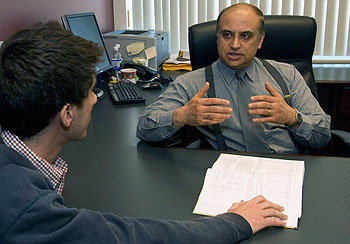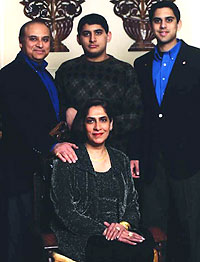Riddle: What do you call a native of India who loves to ski and swears that American football is “the most strategically complex sport ever devised by man”?
You call him Anjan V. Thakor, Ph.D.
In a way, Thakor himself could be called “strategically complex.” On first glance, you might think he’s just another brilliant Olin Business School professor (the John E. Simon Professor of Finance, in fact) who also happens to be a senior associate dean. But take a closer look at his background and activities, and you’ll soon suspect that something different is going on.
Try calling him over spring break or a long weekend, and he’ll be out of town.
Ask other professors at the business school what makes him tick, and they won’t know where to start.
Take a look in his office and you’ll notice his desk is clear of clutter — aside from a few foot-high stacks of papers leaning against the wall off to the side.

Although the evidence points to a man who is seriously slacking off now that he is a chaired professor, nothing could be further from the truth. In Thakor’s five years at WUSTL, he has published nearly 20 papers, monographs or books and presented papers at dozens of conferences. He helped found — and is president of — the Financial Intermediation Research Society, an international organization of people who study banking.
As senior associate dean, he started the Master’s of Science in Finance program. Thakor is involved with the business school’s new strategic plan, which includes creating two research centers at the business school — one for finance and accounting research, and the other for innovation.
Did we mention he also gets rave reviews for his teaching?
For Thakor, all of his activity seems to serve as a fuel for him. Former business school dean Stuart Greenbaum, Ph.D., lured Thakor to WUSTL from Thakor’s tenured position at the University of Michigan. Thakor could have gone anywhere he wanted, but he chose to come to Olin for two reasons: the opportunity to help the business school grow, and his son Richard.
“Washington University was one of the schools my son was considering for college at that time. All the schools he was looking at were places that we had some connection to: Northwestern, my alma mater; and University of Michigan, where I was teaching,” Thakor says. “He was admitted to all three, and I thought he was leaning toward Northwestern. But he came to St. Louis for a three-day visit, and they did such a great job recruiting him that he came back saying he definitely wanted to go to Wash U. So, he made his decision to come here before I did, and it seemed that everything fell into place.”
Richard has since graduated, moving on to pursue a master’s degree in economics and finance at the London School of Economics, and Thakor’s second son, Cullen, 19, is next in line for college.
Regardless of the influence his son might have had on his decision to come here, Thakor knows it was the right choice.
“One of the exciting things about being here has been the change and growth,” he says. “I’ve been able to do things since I came here that I’m very pleased about — such as the M.S. in Finance program.”
‘A franchise player’
It was precisely because of Thakor’s energy and reputation that Greenbaum recruited him. The two men have known each other since Thakor’s time as a doctoral student at Northwestern University. Greenbaum was his thesis advisor.

“He hasn’t changed since he was a graduate student,” Greenbaum says. “He was indefatigable then, and he’s indefatigable now. The level of energy, perseverance and focus that Anjan has is extraordinary, and he brings that to everything he does, whether it’s his academic research, professional work or family life.”
In order to express just how valuable an addition Thakor has been to Olin, Greenbaum uses a sports analogy:
“He’s a franchise player,” he says. “He’s a builder; he helped build the finance department. In fact, all but a few of the finance professors are here because of Thakor. He’s trained more Ph.D. students than anyone I know. His reputation is very strong in academic finance circles. He has done a ton of consulting for businesses. And he loves research. The list of published articles and books that he’s written is at least three times longer than mine.”
Thakor admits that research brings him a tremendous amount of satisfaction. In fact, he says, it borders on an obsession.
“I grab every little opportunity I have to do it,” Thakor says. “For me, research fulfills the same need that leisure or relaxation does for other people. A lot of people around me don’t always understand that. But it’s the essence of who I am. I think for most people, though, if they have a passion, they find a way to fit it in.”
Football as a metaphor
Most of Thakor’s recent research focuses on corporate finance and financial intermediation, which he says is mostly banking. Specifically, he focused on the issue of disagreement among economic agents who come together on transactions.
“In economics and finance, there is a dominant paradigm that everybody has the same beliefs, either at the outset of a transaction or after they’ve exchanged information. To a layperson, that might seem like a bizarre assumption, but it’s become dogma within economics. There are some strands of economics where researchers are working with frameworks where that assumption is relaxed; where people have heterogeneous beliefs and that could lead to disagreement over optimal decisions, even when people have the same information and the same objective.”
|
Anjan V. Thakor |
Titles: The John E. Simon Professor of Finance and senior associate dean of the Olin Business School Family: wife, Serry; sons Richard, 23, and Cullen, 19 Personality flaw: : Impulse shopper. Thakor bought a house on spec in Estes Park, Colo., after only three days of house hunting. Why? He and his family fell in love with the town a number of years ago when they wound up spending the night there while driving home from a conference in Wyoming. What was to be a one-night stopover turned into a multiday vacation. It then became a family tradition to spend several days in Estes Park every year. Twelve years ago, Thakor solidified his connection to Estes Park by buying a house. Eventually, he and his son Richard learned to ski. |
Thakor has taken this new paradigm and studied what the implications are in a variety of financial situations, such as what kinds of securities a firm will issue, or if a company should go public or private.
“Disagreement leads to an endogenous preference for control. If I know that you and I are going to disagree, then who controls the decision-making becomes very important to determine before the disagreement occurs. It has implications for capital structure, dividend policy, the choice of private versus public ownership, and other financial decisions. All of these things impinge on how control rights are allocated between managers and investors,” Thakor says.
Another area of research that Thakor has been pursuing is the strategy of football. Yes, football.
Thakor did not grow up following the NFL, but, at some point during his doctoral studies, he was introduced to the sport. Since then, he has been hooked.
“To call me a football fan is an understatement,” Thakor says. “In my view, football is the most strategically complex sport ever devised by man. I don’t think any other sport even comes close. On average, you have 65 plays on defense, 65 plays on offense, or 130 opportunities to coach. What you do on Play 1 is going to affect how the other team reacts if you do the same play later in the game.”
Thakor has managed to combine his passion for football with that for research. He is conducting long-term research with colleague Barton Hamilton, Ph.D., the Robert Brookings Smith Distinguished Professor of Entrepreneurship, to test his hypotheses on what makes for optimal strategies. They’ve been collecting data that will enable them to compare what theory says the optimal strategy is with what a team actually did.
“We’re hoping to publish this in a good economics journal, where we talk about how football is a metaphor for the optimality of economic decision-making in the face of uncertainty,” Thakor says.
People might scoff at the idea of merging economic research with football — but they don’t know Thakor, a man whose energy level is so intense that watching a game of football is equivalent to spending a day immersed in research.